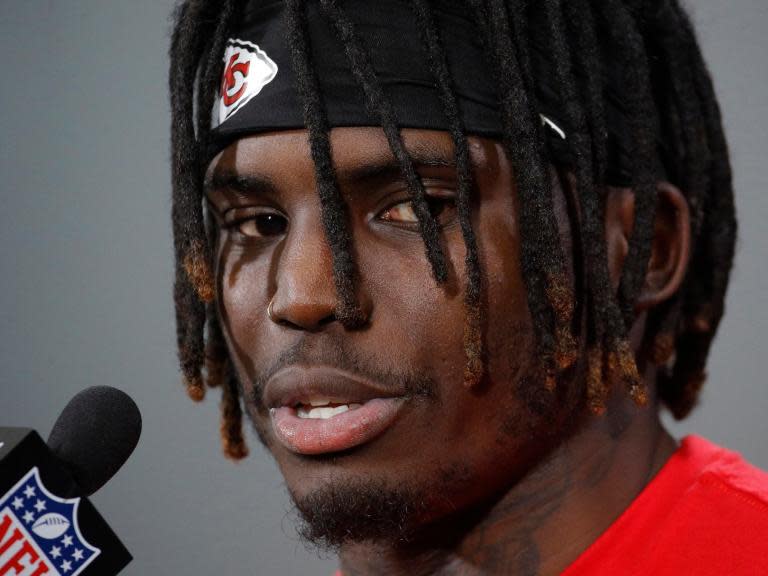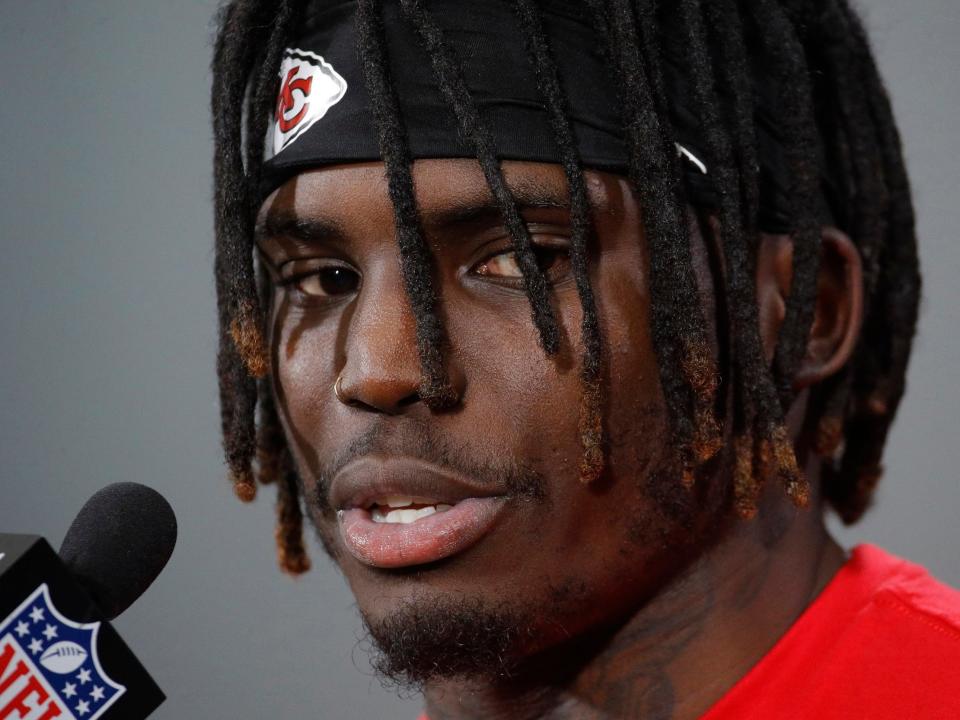The NFL is engulfed in another domestic abuse scandal – so punish the teams for their players’ behaviour
Even the NFL’s wildly successful college draft in Nashville couldn’t keep the spotlight off the league’s latest domestic abuse controversy for long.
Kansas City Chiefs’ star receiver Tyreek Hill was suspended from team activities just over a week ago after a disturbing recording emerged, allegedly featuring Hill and his fiancee Crystal Espinal discussing their three-year-old son. When it came to the subject of the child’s broken arm, Espinal says in the recording that he claimed “Daddy did it”, which Hill denies. She also alleges Hill punched the boy and used a belt to discipline him.
“He is terrified of you,” she says.
“You need to be terrified of me too, b***h,” he replies.
ESPN earlier this week obtained a letter Hill’s lawyers wrote to the NFL denying he ever hit his son or grabbed the boy’s arms. It also says he will co-operate with the league’s investigations. Until they are resolved, the NFL will once again find itself under an unwelcome spotlight.
The league and its teams have struggled with a series of ugly scandals in recent years, and their response has often been found wanting.
Perhaps the most notorious case is that of Ray Rice, a former running back for the Baltimore Ravens, who knocked his then fiancee – now wife – unconscious in an elevator in a New Jersey casino.
Criminal charges were ultimately dropped, and the NFL subsequently suspended the player for just two games, until video of the incident emerged which ended the player’s career. Critics of the initial suspension pointed out that it was half of that handed to New England Patriots quarterback Tom Brady for something far more trivial: his alleged involvement in a scheme to deflate footballs to make them easier to pass.
The league’s controversial personal conduct policy was subsequently tightened, but the incidents keep on occurring.
One of the problems confronting the NFL is that its teams have a perverse incentive to hire players with a history of abusing their partners and/or children.
There were some very obvious red flags about Hill coming out of college. He pleaded guilty to domestic battery by strangulation of Espinal when she was pregnant, which got him three years of probation and his marching orders from the Oklahoma State University football team.
That meant he fell to the fifth round of the draft, at which point the Chiefs took a chance on him. They were richly rewarded for doing so, getting a first round talent whose athletic gifts are such that it is all but impossible for defenders to cover him.
Since the tape emerged, he has been afforded due process by the team when a back up player, for example, may well have been immediately cut.
The Chiefs did that with their star running back Kareem Hunt in 2018, but he was caught on video shoving and kicking a woman during an incident in a hotel. Other incidents of violence have subsequently been reported.
Despite a looming league mandated suspension, however, the Cleveland Browns picked him up. “He deserves a second chance,” said the team’s general manager John Dorsey.
The fact that no one said that about Rice after the video of him emerged may not have been unrelated to the fact that 29-year-old running backs with yards-per-carry averages of just three aren’t in high demand. Hunt is younger, and better, another rare talent available on a cheap rookie deal.
Players like him will keep on getting second, and third chances, if they have sufficient ability, which poses a problem for a league keen to attract families to its games.
But what if it were to make such players more risky bets than they currently are?
One solution commentators have suggested is that the league punish teams, as well as players, if they fall foul of its policies on domestic abuse and are signed despite already having a record.
There is no higher currency in the NFL than draft picks, which confer access to players on cheap, cost-controlled rookie deals.
Teams may be less inclined to take a gamble on players like Hunt and Hill if they are penalised for future incidents along with the player. They may ask tougher questions, and put in place systems with a view to preventing a repeat in the event that they do. The same system could also be applied to those involved in sexual assaults.
Its use would need to be strictly limited to such unforgivable behaviour.
There are plenty of other kids who raise red flags for reasons other than knocking seven bells out of their partners. Substance abuse, alcohol abuse and petty theft aren’t unusual among college kids. Young people, even those with an eye on multi-million dollar contracts, are apt to make mistakes.
Tyrann Mathieu, who expressed his disappointment in the Hill situation upon joining the Chiefs, is a fine example.
He was kicked out of his college, reportedly for failing drug tests. He entered rehab, applied to rejoin the team, but was subsequently arrested for possession of marijuana.
Mathieu had a troubled upbringing. His family lost everything during Hurricane Katrina and he witnessed horrors. His best friend was murdered.
The Arizona Cardinals took a chance on him, and he has proven to be a model citizen since then in a career spanning three separate teams. A tweet he issued urging people to “fall forward” went viral. The league has been as guilty of over reacting in some situations as it has of under reacting to domestic violence in the past – you wouldn’t want to deny someone like him the chance of turning things around.
But there is a big difference between smoking a spliff and beating up one’s partner. It’s a shame that that has to be stated.


